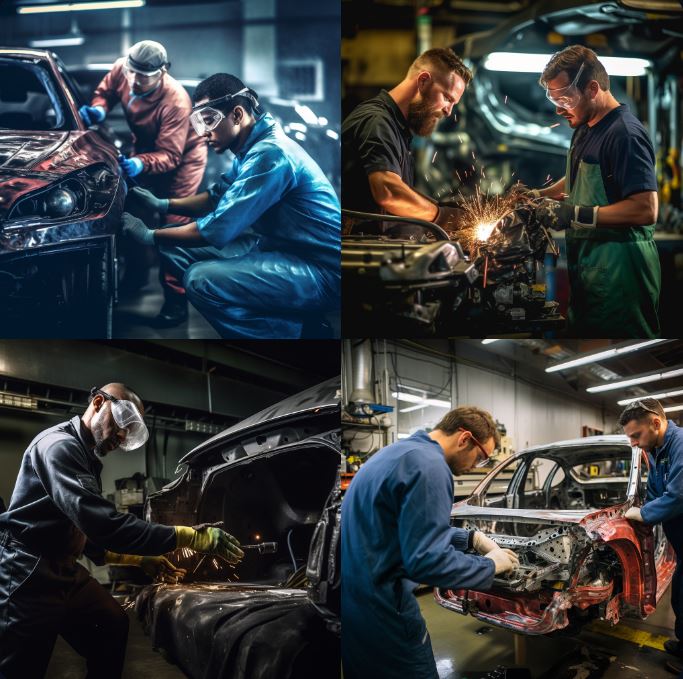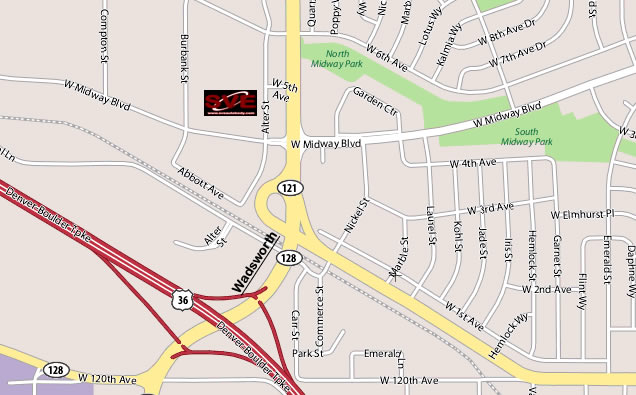What is the Difference Between a Car
Mechanic and an Autobody Repair Specialist?

In the world of automotive repair and maintenance, there are two crucial professionals who play distinct but equally important roles.
As a vehicle owner, it’s essential to understand the difference between these two professions and the specific expertise they bring to the table.
Whether you’re seeking repairs for mechanical issues or dealing with the aftermath of a collision, knowing which expert to approach can save you time, money, and ensure the best possible outcome for your vehicle. In this comprehensive guide, we will delve into the disparities between car mechanics and autobody repair specialists, shedding light on their unique skill sets, responsibilities, and the services they offer.
By the end of this article, you will have a clear understanding of the roles these professionals play in the automotive industry and be equipped with the knowledge to make informed decisions when it comes to maintaining and repairing your vehicle. So let’s dive in and explore the intriguing world of car mechanics and autobody repair specialists!
II. Understanding Car Mechanics
A. Definition and Role of a Car Mechanic
A car mechanic, also known as an automotive technician, is a skilled professional who specializes in diagnosing, repairing, and maintaining various mechanical components of vehicles. These individuals possess a deep understanding of automotive systems and are trained to identify and fix issues that arise in engines, transmissions, brakes, steering systems, electrical systems, and more.
B. Skills and Qualifications Required
- Technical Knowledge: Car mechanics have a solid foundation of technical knowledge related to automotive systems, including engines, drivetrains, fuel systems, and electrical components. They stay updated with the latest advancements in automobile technology.
- Problem-solving Abilities: Effective car mechanics possess strong problem-solving skills to diagnose complex issues accurately. They use their expertise, intuition, and diagnostic tools to identify the root cause of problems and develop effective repair strategies.
- Manual Dexterity: Car mechanics work with intricate parts and tools, requiring excellent manual dexterity. They can handle delicate components and perform precise tasks such as disassembling, repairing, and reassembling various parts.
- Attention to Detail: Attention to detail is crucial for car mechanics, as they must carefully inspect and analyze vehicle components, ensuring that all repairs are performed accurately and safely.
C. Common Tasks Performed by Car Mechanics
- Engine Diagnostics and Repair: Car mechanics have expertise in diagnosing engine issues, performing tests, and repairing or replacing faulty components such as spark plugs, fuel injectors, and timing belts.
- Brake System Maintenance and Repair: They inspect and repair brake systems, including replacing brake pads, rotors, calipers, and brake lines to ensure optimal performance and safety.
- Suspension and Steering Repairs: Car mechanics handle repairs and maintenance of suspension systems, shocks, struts, and steering components to ensure smooth and safe handling of the vehicle.
- Electrical System Troubleshooting and Repairs: They diagnose and repair electrical problems, including issues with wiring, fuses, starters, alternators, and battery systems.
- Routine Maintenance Tasks: Car mechanics perform routine maintenance tasks like oil changes, filter replacements, tire rotations, and fluid checks to keep vehicles running smoothly and prevent potential issues.
By possessing a comprehensive understanding of the mechanical aspects of vehicles, car mechanics are integral to ensuring the reliable performance and longevity of automobiles.
III. Exploring Autobody Repair Specialists
A. Definition and Role of an Autobody Repair Specialist
An autobody repair specialist, also known as a collision repair technician, is a highly skilled professional who specializes in repairing and restoring the exterior of vehicles that have been damaged due to accidents, collisions, or other incidents. Their primary focus is on restoring the aesthetics and structural integrity of the vehicle’s body.
B. Skills and Qualifications Required
- Body Repair Techniques: Autobody repair specialists are proficient in various body repair techniques, including dent removal, scratch repair, panel replacement, and frame straightening. They have a keen eye for detail and the ability to reshape and mold damaged body panels.
- Paint Application and Refinishing: These specialists have expertise in preparing surfaces, matching paint colors, and applying paint using different techniques such as spraying, blending, and clear coating. They ensure a seamless and flawless finish that matches the original factory appearance.
- Welding and Structural Repair: Autobody repair specialists possess skills in welding and structural repair to address damage to the vehicle’s frame and body structure. They utilize specialized equipment to restore the structural integrity of the vehicle.
- Knowledge of Materials: They have a deep understanding of different automotive materials, including metals, plastics, fiberglass, and composites. This knowledge helps them select the appropriate materials for repairs and ensure proper adhesion and durability.
C. Common Tasks Performed by Autobody Repair Specialists
- Collision Repair and Frame Straightening: Autobody repair specialists evaluate the extent of damage caused by collisions and accidents, perform structural repairs, and align the vehicle’s frame to its original specifications.
- Dent and Scratch Removal: They utilize various techniques, such as paintless dent repair (PDR) or traditional methods, to remove dents and repair scratches, ensuring a smooth and flawless surface.
- Painting and Refinishing: Autobody repair specialists prepare damaged surfaces, match paint colors, and apply paint and clear coats to restore the vehicle’s appearance. They use specialized equipment and techniques to achieve a professional and seamless finish.
- Windshield and Glass Repairs/Replacements: These specialists repair small cracks or chips in windshields and replace damaged or shattered glass components to ensure driver visibility and safety.
- Restoring Vehicle Aesthetics and Structural Integrity: Autobody repair specialists take pride in their ability to restore the overall aesthetics and structural integrity of damaged vehicles. They pay attention to detail and ensure that the repaired areas seamlessly blend with the rest of the vehicle.
With their expertise in autobody repairs, these specialists play a vital role in restoring damaged vehicles to their pre-accident condition and maintaining their visual appeal and safety standards.
IV. Education and Training
A. Educational Paths for Car Mechanics
- Trade Schools and Vocational Programs: Many aspiring car mechanics opt for trade schools or vocational programs that offer comprehensive training in automotive technology. These programs provide a structured curriculum covering various mechanical systems and hands-on experience in diagnosing and repairing vehicles.
- Apprenticeships and On-the-Job Training: Another pathway to becoming a car mechanic is through apprenticeship programs. These programs combine classroom instruction with practical, on-the-job training under the guidance of experienced mechanics. Apprenticeships provide valuable real-world experience and the opportunity to learn from seasoned professionals.
- Certifications and Specialized Training: Car mechanics can pursue certifications from reputable organizations, such as the National Institute for Automotive Service Excellence (ASE). These certifications validate the mechanic’s skills and knowledge in specific areas, such as engine repair, brakes, electrical systems, and more. Ongoing specialized training and continuing education are also essential to keep up with advancements in automotive technology.
B. Educational Paths for Autobody Repair Specialists
- Trade Schools and Vocational Programs: Aspiring autobody repair specialists can enroll in trade schools or vocational programs that offer specialized training in collision repair and refinishing. These programs cover topics such as body repair techniques, paint application, welding, and frame straightening. Students gain hands-on experience in working with different materials and tools used in autobody repair.
- Apprenticeships and On-the-Job Training: Similar to car mechanics, autobody repair specialists can benefit from apprenticeship programs. Working under the supervision of experienced professionals, apprentices learn repair techniques, refinishing skills, and gain practical knowledge in repairing damaged vehicles.
- Certifications and Specialized Training: Autobody repair specialists can pursue certifications, such as the Inter-Industry Conference on Auto Collision Repair (I-CAR) certifications. These certifications validate their proficiency in specific areas of autobody repair and serve as a mark of excellence in the industry. Ongoing training and staying updated with the latest repair techniques and technologies are crucial for autobody repair specialists.
Both car mechanics and autobody repair specialists can enhance their knowledge and skills through a combination of formal education, practical training, and professional certifications. Continuous learning and staying abreast of industry advancements are essential to excel in these fields.
V. Tools and Equipment
A. Essential Tools for Car Mechanics
- Diagnostic Tools: Car mechanics utilize diagnostic tools such as scan tools, code readers, and multimeters to identify and troubleshoot issues in the vehicle’s electronic systems, engine, and other components.
- Hand Tools: A comprehensive set of hand tools is essential for car mechanics, including wrenches, socket sets, screwdrivers, pliers, and torque wrenches. These tools help with tasks like removing and tightening bolts, nuts, and various fasteners.
- Power Tools: Car mechanics often use power tools like impact wrenches, pneumatic drills, and grinders to speed up tasks such as removing lug nuts, drilling holes, and grinding metal surfaces.
- Lifts and Jacks: Lifts and jacks are crucial for raising vehicles, providing access to the undercarriage for repairs and maintenance tasks like oil changes, exhaust system repairs, and suspension work.
- Engine Tools: Car mechanics rely on specialized engine tools such as compression testers, valve spring compressors, and timing light tools to diagnose and perform repairs on the engine.
B. Specialized Tools for Autobody Repair Specialists
- Dent Removal Tools: Autobody repair specialists use tools like dent pullers, dent rods, and dent hammers to carefully manipulate and remove dents from vehicle body panels.
- Paint and Refinishing Tools: These specialists require tools such as spray guns, paint mixing equipment, sanding blocks, and buffing pads to apply paint, blend colors, and achieve a seamless finish during the refinishing process.
- Welding Equipment: Autobody repair specialists use welding equipment, including MIG welders, spot welders, and plasma cutters, to repair damaged metal structures and replace body panels.
- Frame Straightening Tools: Frame straightening requires specialized equipment like hydraulic frame machines, pulling chains, and measuring systems to realign and restore the vehicle’s frame to its original specifications.
- Glass Repair Tools: Autobody repair specialists utilize tools such as glass suction cups, glass cutting tools, and adhesive application tools for repairing or replacing damaged windshields and windows.
C. Technological Advancements in the Industry
Both car mechanics and autobody repair specialists benefit from advancements in automotive technology. This includes tools and equipment like computerized diagnostic scanners, advanced welding machines, paint-matching systems, and laser measuring systems for precise repairs and refinishing.
Staying up-to-date with the latest tools and equipment is essential for both car mechanics and autobody repair specialists to efficiently and effectively perform their tasks, ensuring quality repairs and customer satisfaction.
VI. Work Environment and Job Outlook
A. Work Settings for Car Mechanics
- Repair Shops: Many car mechanics work in repair shops, which may be independently owned, franchised, or part of a dealership. These shops handle a wide range of vehicle repairs, maintenance, and diagnostics.
- Dealerships: Car mechanics are employed by vehicle dealerships to perform repairs, maintenance, and warranty work on the specific brand(s) of vehicles sold by the dealership.
- Specialty Shops: Some car mechanics specialize in specific areas such as transmission repair, brake systems, or electrical systems and work in specialty shops dedicated to those areas.
- Self-Employment: Experienced car mechanics have the option to start their own repair businesses, either operating from a dedicated shop or providing mobile repair services.
B. Work Settings for Autobody Repair Specialists
- Collision Repair Centers: Autobody repair specialists commonly work in collision repair centers or body shops. These facilities specialize in repairing vehicles damaged in accidents or collisions, providing comprehensive autobody repair services.
- Dealership Body Shops: Vehicle dealerships often have dedicated autobody repair facilities to handle repairs, refinishing, and restoration of vehicles within their brand.
- Independent Autobody Shops: Independent autobody shops offer repair and refinishing services for a variety of vehicles, providing specialized expertise in autobody repair.
- Insurance Companies: Autobody repair specialists may find employment in autobody departments of insurance companies, assessing and overseeing repairs for insurance claims.
C. Demand and Job Prospects in the Automotive Industry
- Car Mechanics: The demand for car mechanics remains steady as the number of vehicles on the road continues to increase. Technological advancements, particularly in hybrid and electric vehicles, create a need for specialized knowledge in these areas. Job prospects are generally favorable, especially for those with formal education, certifications, and advanced diagnostic skills.
- Autobody Repair Specialists: The demand for autobody repair specialists is closely tied to the number of accidents and collisions occurring. As long as vehicles are involved in accidents, there will be a need for autobody repairs. Job prospects are influenced by the overall economy, but those with strong skills, experience, and certifications may have more opportunities for employment.
As technology continues to evolve, car mechanics and autobody repair specialists need to stay updated with the latest diagnostic techniques, repair methods, and advancements in vehicle systems. Continuous learning and adaptability are crucial for success in these professions.
VII. Compensation and Benefits
A. Average Salaries for Car Mechanics
- Entry-Level Mechanics: Entry-level car mechanics typically earn an average annual salary ranging from $30,000 to $40,000. This can vary based on factors such as location, level of experience, and the type of employer.
- Experienced Mechanics: With increased experience and expertise, car mechanics can expect higher salaries. Experienced mechanics may earn annual salaries ranging from $40,000 to $60,000, or even more, depending on their skill level and the demand for their specialized knowledge.
- Specialty and Master Mechanics: Specialty or master mechanics who have advanced certifications, extensive experience, and expertise in specific areas may earn salaries exceeding $60,000 per year. These professionals often command higher wages due to their specialized skills.
B. Average Salaries for Autobody Repair Specialists
- Entry-Level Autobody Repair Specialists: Entry-level autobody repair specialists typically earn an average annual salary ranging from $30,000 to $40,000. The specific salary can be influenced by factors such as location, employer, and level of experience.
- Experienced Autobody Repair Specialists: With increased experience and proficiency in autobody repairs, specialists can earn higher salaries. Experienced autobody repair specialists may earn annual salaries ranging from $40,000 to $60,000, or more, based on their expertise and demand for their skills.
- Certification and Specialized Skills: Autobody repair specialists who hold advanced certifications, specialize in high-demand areas such as advanced refinishing techniques or frame straightening, or possess exceptional skills may have higher earning potential.
C. Additional Benefits and Perks in the Profession
- Health Insurance and Retirement Benefits: Many employers in the automotive repair industry offer health insurance packages and retirement benefits to their employees, including car mechanics and autobody repair specialists.
- Paid Time Off and Vacation: Depending on the employer, car mechanics and autobody repair specialists may receive paid time off, vacation days, and holidays.
- Skill Development and Training: Employers often invest in the professional development of their mechanics and autobody repair specialists, providing opportunities for ongoing training, certifications, and skill enhancement.
- Job Stability: The demand for car mechanics and autobody repair specialists provides a level of job stability, as there will always be a need for their services as long as vehicles require maintenance and repair.
- Employee Discounts: Some employers in the automotive industry offer employee discounts on vehicle repairs, parts, and even vehicle purchases.
It’s important to note that compensation and benefits can vary depending on factors such as geographic location, level of experience, the size of the employer, and the overall economic conditions.

IX. Conclusion
In the automotive repair industry, car mechanics and autobody repair specialists each play distinct roles, contributing to the overall health and functionality of vehicles. Understanding the difference between these professions is essential for vehicle owners seeking maintenance, repairs, or restoration services.
Car mechanics specialize in diagnosing and repairing the mechanical components of vehicles, ensuring proper functioning of engines, brakes, steering systems, and more. On the other hand, autobody repair specialists focus on repairing and restoring the exterior of vehicles, addressing damages caused by accidents or collisions and restoring aesthetics and structural integrity.
Both car mechanics and autobody repair specialists require specific skills, knowledge, and training. Car mechanics need technical expertise in mechanical systems, diagnostic tools, and problem-solving abilities. Autobody repair specialists excel in body repair techniques, painting, welding, and structural repairs.
Education and training paths for these professions include trade schools, vocational programs, apprenticeships, and obtaining certifications from reputable organizations. Continuous learning and staying updated with technological advancements are crucial for success in these fields.
Car mechanics can find employment in repair shops, dealerships, or specialized shops, while autobody repair specialists typically work in collision repair centers, dealerships’ body shops, or independent autobody shops.
Compensation for car mechanics and autobody repair specialists can vary based on experience, location, and specialization. Average salaries range from entry-level positions to more experienced and specialized roles, with additional benefits such as health insurance, retirement benefits, and opportunities for skill development.
In conclusion, car mechanics and autobody repair specialists are indispensable professionals in the automotive industry. Their expertise ensures that vehicles are not only mechanically sound but also aesthetically appealing and safe to drive. By understanding the distinctions between these two professions, vehicle owners can make informed decisions when seeking maintenance, repairs, or autobody restoration services, ultimately prolonging the lifespan and value of their vehicles.









